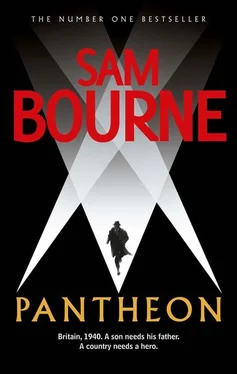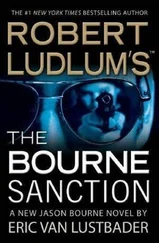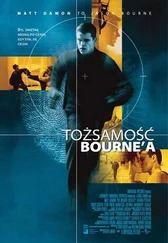Sam Bourne - Pantheon
Здесь есть возможность читать онлайн «Sam Bourne - Pantheon» — ознакомительный отрывок электронной книги совершенно бесплатно, а после прочтения отрывка купить полную версию. В некоторых случаях можно слушать аудио, скачать через торрент в формате fb2 и присутствует краткое содержание. Жанр: Триллер, на английском языке. Описание произведения, (предисловие) а так же отзывы посетителей доступны на портале библиотеки ЛибКат.
- Название:Pantheon
- Автор:
- Жанр:
- Год:неизвестен
- ISBN:нет данных
- Рейтинг книги:3 / 5. Голосов: 1
-
Избранное:Добавить в избранное
- Отзывы:
-
Ваша оценка:
- 60
- 1
- 2
- 3
- 4
- 5
Pantheon: краткое содержание, описание и аннотация
Предлагаем к чтению аннотацию, описание, краткое содержание или предисловие (зависит от того, что написал сам автор книги «Pantheon»). Если вы не нашли необходимую информацию о книге — напишите в комментариях, мы постараемся отыскать её.
Pantheon — читать онлайн ознакомительный отрывок
Ниже представлен текст книги, разбитый по страницам. Система сохранения места последней прочитанной страницы, позволяет с удобством читать онлайн бесплатно книгу «Pantheon», без необходимости каждый раз заново искать на чём Вы остановились. Поставьте закладку, и сможете в любой момент перейти на страницу, на которой закончили чтение.
Интервал:
Закладка:
He reached for one of those damnable candlesticks and, satisfied by the weight of it in his hand, threw it squarely at the window looking out on the back garden: it sailed through, smashing the glass but clipping the window-frame on its exit, splitting the white wood. He heard it land hard on the flagstones beyond. To hell with the bloody Walsinghams and their bloody adulterous daughter!
Next he turned to the dresser, containing their best china. He opened the glass-fronted door and removed the largest plate, and hurled it, discus-style, in the same direction as the candlestick. It went askew, smashing on the wall to the right of the window. The noise was too feeble to sate him, so he took another plate and threw that one to the floor. Softened by the rug, it broke in two with a single crack. Reaching for a third, he smashed it on the table before him; it cut his wrist on impact, producing a jagged wound. The sight of the welling blood brought the eruption to a halt and suddenly he felt tired, spent.
And now came the reckoning, the feeling of disgust that followed release. He surveyed his surroundings, strewn with rubble of his own making. So much destruction. Again.
He stumbled towards Harry’s room and slumped onto his son’s infant bed, imagining he could still feel the boy’s warmth. At this moment, Harry was probably walking between Florence and the man who had stolen her from him. They were each holding one of the boy’s hands, calling out ‘one-two-three’ then lifting and swinging him through the air. The man was smiling at Florence who was looking more beautiful than ever. How long before Harry called him Daddy?
As if trying to escape the thought, James headed to his study, now as cavernously empty as the rest of the house, suddenly desperate for a cigarette. The first hit of nicotine flooded through him, swamping his neural circuitry, just as he wanted it to. As he exhaled, a fresh thought occurred to him, one sparked by the ache in his shoulder, now pulsing with increased voltage. Florence had tired of him, and who could blame her?
She had tired of living with an invalid. Not yet thirty, James was already a veteran with a war wound. A cripple. Yes, he could row, though at nothing like his former strength and at such enormous effort. He was still a cripple, rejected three times for military service, despite his repeated appeals and best endeavours at string-pulling in Whitehall. So what did that make him? A cripple who tried hard. A Victorian oddity, on display in a travelling show. Good old James: shoulder smashed to pieces, but still he does make a jolly good effort, I’ll say that for him.
Florence, on the other hand, was twenty-four and in her impeccable prime. Why would such a perfect creature want to be paired with a physically damaged specimen, why would she tolerate it? She needed more than he could give her.
He thought of the first time, not long after it happened, when he had realized this. They were back in England, married for less than a year. He had woken with a terrible thirst and croaked out, ‘Florence! Florence?’
And then he had seen that her side of the bed was empty. He had hauled himself up and staggered to the kitchen. He had been about to go inside when he had stopped short, halted by the sound of sobbing. He had watched her for what seemed like an hour, though it was probably no more than seconds. Her back had been to him, her shoulders rising and falling in rapid, short jerks. She was pregnant and he had decided that she must be in pain, that there must be some kind of complication and that she needed his help. He had stepped forward, drawing level with the doorway, before realizing that she was, in fact, crying for him — for what he had once been and for what he would never be again. He had opened his mouth, his lips forming his wife’s name, but they emitted no sound, just a dry, papery rasp. She did not turn around.
He had returned to their bed without her ever noticing that he had left it. And that was hardly the last time he had seen her cry.
The memory left a bitter taste: he decided he needed a drink. He poured himself a full glass of Scotch, downed it, then poured another. Florence had left him before, he now thought. After their very first week together, she had left him. Or that was how he had understood it at the time.
She had told him she was going to Berlin, to take up the place she had never formally surrendered in the British Olympic team. He had accused her of vanity, of betraying the principles that surely they both shared. He had embarrassed himself, speaking of ‘us’, as if they had sworn solemn vows, when they had known each other for little more than a week. He had sensed in Florence Walsingham a kindred spirit. She was not like Harry, with his ideological tracts and his alphabet soup of political parties. She seemed to see things the way he did: that what was happening around them was not really about politics, but about right and wrong. You didn’t have to carry a party card to know the difference, to know on which side of the line a decent person had to stand. By heading to Berlin, she had announced she was crossing over to the other side.
He was the older of the two of them, and yet he had been so bloody juvenile. So naive. She had told him to trust her, that she was going to make her point in her own way, but he had not listened.
Instead he and Harry Knox had stayed in Spain, to do what they could to defend the now-endangered republic. They had watched as a flood of French communists who had made the same decision poured into both the Basque country and Catalonia. As those volunteers and others from all over Europe and beyond gradually formed into the International Brigades, he and Harry gladly signed up.
There had been quite a few people in their position, two hundred by one estimate: athletes who had been expecting to take part in the People’s Olympiad but who would soon find themselves learning how to dig a trench or use a rifle. (It was a Czech, tipped for gold in the twenty-five metre rapid-fire pistol event, who had first taught James his safety catch from his trigger.)
Most there were like Harry, serious men driven by political conviction — and that conviction was usually Marxism. Some saw the Spanish republic as a laboratory experiment, a test bed for socialism that had to be protected. But plenty saw it the way James did. He had been adamant that he would not be used as an extra in Hitler’s pageant of the master-race in Berlin, and he was equally clear that Francisco Franco and his fascist allies in the Falange could not be allowed to overturn the will of the Spanish people by toppling a government the people had chosen. It was a clash of democracy versus brute force: pretty straightforward really.
And what James could not deny, though he would not have admitted it out loud or even quietly to himself, was that this epic struggle between good and evil had come along at the right time — just when he needed a cause in which he could lose himself.
So he was happy to join the internationals as they journeyed first to Valencia, where they paraded through the streets, greeted by flags, placards and ragged banners, their slogans chalked in white, and by endlessly-repeated chants. James heard lots of viva s, quickly echoed by the French communists leading the column, who began to shout Vive le Front Populaire! or Vive la Republique! But the most constant refrain was No Pasaran! the slogan James would see daubed on walls and hear at rallies for most of the next year. As he and Harry walked with others from the International Brigades, diffident and surprised to be feted in such fashion, the townspeople would sometimes join in, walking among them for a block or two, before joining the crowds stretched along the pavements. They were being hailed as heroes, like the warriors of ancient myth. And they had not yet fired a shot. When they came to leave Valencia, and their train was delayed for a long while before moving off, the local women compensated them by offering free kisses to anyone who stuck his head out of the window.
Читать дальшеИнтервал:
Закладка:
Похожие книги на «Pantheon»
Представляем Вашему вниманию похожие книги на «Pantheon» списком для выбора. Мы отобрали схожую по названию и смыслу литературу в надежде предоставить читателям больше вариантов отыскать новые, интересные, ещё непрочитанные произведения.
Обсуждение, отзывы о книге «Pantheon» и просто собственные мнения читателей. Оставьте ваши комментарии, напишите, что Вы думаете о произведении, его смысле или главных героях. Укажите что конкретно понравилось, а что нет, и почему Вы так считаете.












